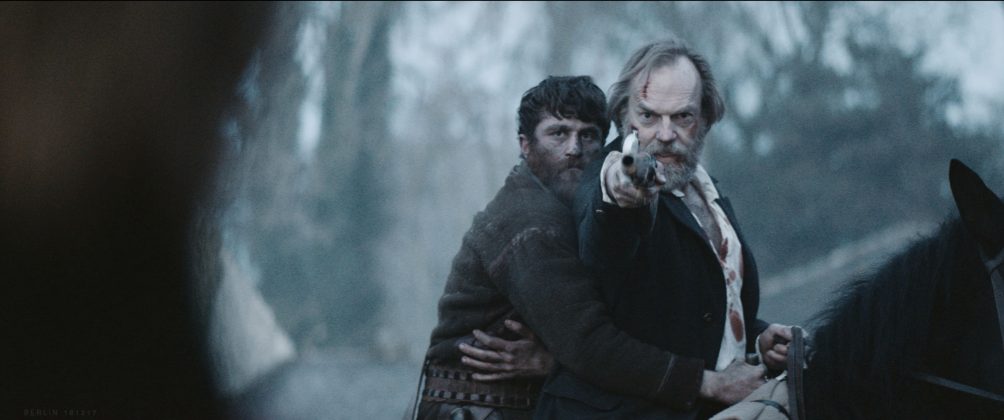
Dir: Lance Daly | Cast: Hugo Weaving, James Frecheville, Stephen Rea, Barry Keoghan, Freddie Fox | Ireland | Drama
Lance Daly’s dreary historical revenge drama revisits the peak of Ireland’s potato famine (1847) from the perspective of a raw and wretched Irish ranger who has served the British Army abroad. The malcontent has a particular axe to grind in this story, and his weapon of choice is a vicious shortened sabre that slices through anyone who gets in his way when his plans to escape the rain-soaked Emerald Isle for pastures new in America are scuppered.
Martin Feeney (a deeply sinister looking Frecheville), has deserted the Imperial army and finds his way back to Ireland to find his family has been largely wiped out and his brother hanged by the local English judge. His neighbours are now outcasts in their own country and Feeney launches a bitter vendetta, clearly posing a a threat to the powers that be. So along comes Captain Hannah (Hugo Weaving) who is tasked by the English, against his will, to track Feeney down.
If Daly’s plan was to worsen British Irish relations further by drudging up a miserable period of the nation’s past, at least he could have made a better more well-balanced job of it than this rather predictable, one-sided and cliche-ridden piece of cinema. The Great Famine was clearly a complete nightmare for both sides. Ireland had become part of the United Kingdom in 1801 but sectarian divisions between Protestants and Catholics causing religious wars during the 17th century had been made worse by the country’s prevailing economic problems in the 19th century and a general fall in global food prices, and Britain’s change to free trade in the 1840s only really benefited the industrialised North where Protestants predominated. The South relied on agriculture and was badly affected by the Famine which was exacerbated by poor weather. So torrential rain, religious differences and the well-known Colonial arrogance of the era, coalesced to create an unmitigated human disaster. It’s only reasonable that a decent tribute should be made but BLACK 47 was no the way to do it. It shows how Irish families were dying, while the English overlords were mercilessly exporting the little grain that was produced, and to make matters even worse, new eviction laws wreaked havoc among the poverty-stricken population producing the equivalent wide-scale homelessness and mortality seen – on a much larger scale – during Stalin’s policy of collectivism.
In this rather clumsy affair, the English are naturally painted as baddies, the cast are forced to be caricatures of pompous prigs, with the most unspeakably racist dialogue to deliver, which they do with aplomb, but flounder with the native Gaelic. There is the Boris Johnson-quiffed officer Pope (Freddie Fox) and his subaltern (Barry Keoghan from The Killing of a Sacred Deer) ). Even Jim Broadbent plays against his normal liberal type as the sneering snob Lord Kilmichael. Irishman Stephen Rea kisses the proverbial Blarney Stone as a wandering troubadour Conneely, who offers to help the English with his ‘lore of the land’. From the get-go you wouldn’t trust him to post a letter, and he’s perfect in the part giving a peerless performance as a sly and slippery savant, flight of foot and mind.
And what a gift this story could have been if more equitable hands had mined the rich vein of dramatic potential in this land of misty seascapes, rich folklore and canny characters smouldering in wait for the British army. Instead we get a one-sided and schematic narrative with the English painted as unremitting rogues and a support cast of zombie-like faceless Irish freaks drifting around in bleached-out set pieces. Each scene is as predictable and the last. The only part with any real nuance, aside from Stephen Rea’s, is Hugo Weaving’s Hannah. There is breadth to his character and he plays the dark horse ’til the final hurdle. But what a travesty the rest of it is. Clearly Black 47 is intended as a flag-waving crowd-pleaser for the Irish, but it is a lazy, feel-bad movie for British audiences, opening old wounds and striking another blow for diplomacy, offering little hope for reconciliation over events that happened in the dim and distant past. MT
BERLINALE FILM FESTIVAL 2018 | 15 – 25 FEBRUARY 2018